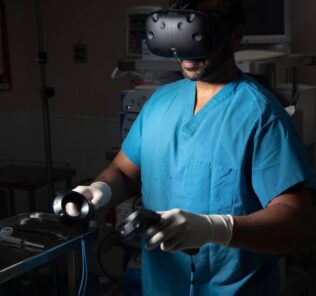Healthcare Simulation Research Update October 2023
The field of healthcare simulation has made tremendous strides forward over the past several decades. One way this revolution is made possible is through clinical simulation research being conducted across the globe. The journal Clinical Simulation in Nursing is constantly sharing updates that include article research reviews, more information on standards of best practice, research briefs, and overall innovations in medical simulation. The journal has an impact factor of 2.6 for 2022 and 2.9 for a 5-Year impact factor. Clinical simulation should be designed, developed, implemented, and evaluated based on the latest research and evidence-based practices that are supported by the Healthcare Simulation Standards of Best Practice. This HealthySimulation.com article by Content Manager Teresa Gore, PhD, DNP, APRN, FNP-BC, CHSE-A, FSSH, FAAN provides an overview of the latest clinical simulation highlights as of September 2023 and explains how these updates impact the healthcare simulation community overall.
Advancing Healthcare Simulation Through Artificial Intelligence and Machine Learning: Exploring Innovations : In an era of unprecedented technological advancements, artificial intelligence (AI) and machine learning (ML) have emerged as transformative tools across various industries. As a cornerstone of education in the health professions, simulation is no exception (Liaw et al., 2023). The integration of AI and ML into healthcare simulation holds the promise of enhancing training effectiveness, optimizing learning outcomes, and ultimately, improving patient care. As we venture into this new frontier, it is crucial to explore the current landscape, acknowledge the achievements, and identify key research needs to take advantage of the full potential of AI and ML in healthcare simulation.
As nursing education continues to evolve in response to advancements in simulation, education strategies must adapt to prepare students effectively. The infusion of AI and ML into nursing simulation offers a revolutionary approach, enhancing personalized learning, fostering critical thinking, and equipping future nurses with the skills needed to excel in their roles. As we venture into this exciting frontier, a delicate balance between technology and human oversight must be maintained, ensuring that the promises of AI and ML are realized ethically and responsibly for the betterment of the student learning experience. However, success in this endeavor requires a collaborative effort from educators, researchers, healthcare professionals, and technology developers. As research in this field progresses, we have the opportunity to harness the power of AI to provide exceptional learning experiences and to shape a new generation of skilled and empathetic healthcare providers.
Sponsored Content:
Early Evidence for Using a Train-the-Trainer Program to Teach Debriefing for Meaningful Learning : Competent debriefers are essential to promote positive learner outcomes. While important, providing training to faculty may be difficult. The Train-The-Trainer (TTT) model is a successful approach for efficiently training large groups of individuals. This study used a purposive, descriptive research design to test the feasibility and effectiveness of a TTT program for teaching debriefers how to implement and train others to use Debriefing for Meaningful Learning (DML). With training, assessment, and individualized feedback, trainers and trainees alike improved their ability to use DML, as well as self-assess their debriefing. The TTT program was a successful, feasible, cost-effective way to provide DML training.
Development of a Multiple-Patient Simulation and its Effectiveness in Clinical Judgment and Practice Readiness: A Randomized Controlled Trial : A Multiple Patient Simulation (MPS) involves multiple low-fidelity or high-fidelity simulators in one simulation setting. Previous research indicates MPS is a promising educational method that reflects the real-world experience of nurses who must care for multiple patients simultaneously. The MPS program was developed according to a six-step approach, and four standardized patients were trained.
This randomized controlled trial examined the effectiveness of the MPS program in clinical judgment and practice readiness. A total of 46 nursing college students participated: 22 in the MPS group and 24 in the control group. A presurvey was conducted, and the experimental group conducted the MPS. Control group participants were provided a video lecture. Both groups completed a postsurvey.
The MPS group showed a significant increase compared to the control group in both clinical judgment (t = 4.95, p < .001) and practice readiness (t = 6.69, p < .001). Findings indicate MPS can be a valuable training method to help nursing students prepare for nursing practice.
Sponsored Content:
More About Clinical Simulation in Nursing
Clinical Simulation in Nursing is an international, peer-reviewed journal published online monthly. Clinical Simulation in Nursing is the official journal of the International Nursing Association for Clinical Simulation and Learning (INACSL) and reflects the organization’s mission to advance the science of healthcare simulation.
Articles are indexed in the Science Citation Index Expanded, Journal Citation Reports/Science Edition, Social Science Citation Index, Journal Citation Reports/Social Sciences Edition, and Current Contents/Social and Behavioral Health Sciences. INACSL reviews and accepts articles from other health provider disciplines, if they are determined to be of interest to the INACSL readership. The journal accepts manuscripts meeting one or more of the following criteria:
- Research articles and literature reviews (e.g. systematic, scoping, umbrella, integrative, etc.) about simulation
- Innovative teaching/learning strategies using simulation
- Articles updating guidelines, regulations, and legislative policies that impact simulation
- Leadership for simulation
- Simulation operations
- Clinical and academic uses of simulation
More About INACSL
The International Nursing Association for Clinical and Simulation Learning (INACSL) is an association dedicated to advancing the science of healthcare simulation. With over 1,800 members worldwide, the organization’s mission is to be the global leader in the art and science of healthcare simulation through excellence in nursing education, practice, and research.
INACSL’s goal is also to advance the science of nursing simulation by providing professional development, networking resources, and leadership in defining healthcare simulation standards of best practice. INACSL membership provides the education, resources, and tools that best address current challenges and help support learners, educators, and professional goals related to the learning of healthcare simulation’s latest developments. This is while ensuring that these individuals are enabled to provide the most comprehensive education and training for high-quality patient care.
Whether someone is new to healthcare simulation and is looking to understand the fundamentals or is experienced and seeking the latest updates and research, INACSL can provide them with the support they need. Membership in INACSL is based on connection, engagement, support, and inspiration.
Learn More About the Clinical Simulation in Nursing Journal!
Teresa Gore, PhD, DNP, APRN, FNP-BC, CHSE-A, FSSH, FAAN – Dr. Gore has experience in educating future nurses in the undergraduate and graduate nursing programs. Dr. Gore has a PhD in Adult Education, a DNP as a family nurse practitioner, and a certificate in Simulation Education. Dr. Gore is an innovative, compassionate educator and an expert in the field of healthcare simulation. In 2007l Teresa started her journey in healthcare simulation. She is involved in INACSL and SSH. She is a Past-President of INACSL and is a Certified Healthcare Simulation Educator Advanced (CHSE-A). In 2018, she was inducted as a Fellow in the American Academy of Nursing (FAAN). In 2021, she was inducted as a Fellow in the Society of Simulation in Healthcare Academy (FSSH) and selected as a Visionary Leader University of Alabama at Birmingham School of Nursing Alumni. During her career, Dr. Gore has led in the development and integration of simulation into all undergraduate clinical courses and started an OSCE program for APRN students. Her research interests and scholarly work focus on simulation, online course development and faculty development. She has numerous invited presentations nationally and internationally on simulation topics.
Sponsored Content:


















